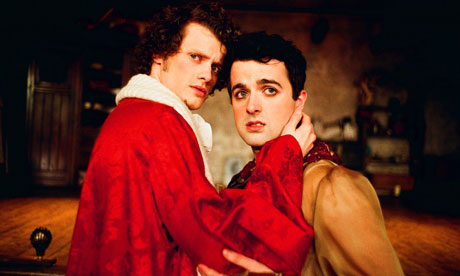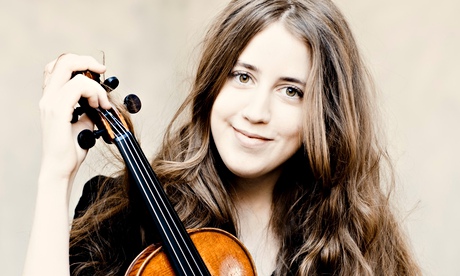Torches flash in the darkness as a party of naughty schoolboys discovers the magical interior of Wilton's Music Hall, that secret palace of varieties hidden away down an alley in London's East End. Amid all the backstage paraphernalia they find a Narnia-like wardrobe and a dusty copy of Gilbert and Sullivan's Iolanthe, and in a "let's do the show right here" moment they are neatly into the opening chorus – with an all-male cast.
"We are dainty little fairies," sing the boys to audience guffaws, but it quickly becomes apparent that this is no mere Carry on Camping; this cast is regenerating G&S in front of our eyes. If you remember the impact of Joe Papp's ground-breaking Pirates of Penzance 30 years ago then this is a similar moment: a tired operetta kicked into new, fizzing and funny life.
Papp's Pirates overturned the deadening D'Oyly Carte tradition that had preserved the operettas in aspic; Sasha Regan and her rip-roaring team tried the same with an all-male Pirates last year, but that had too much of the "Hello sailor" about it really to float my boat. This Iolanthe is altogether more successful, full of imaginative direction, inventive ideas and moments of truly affecting pathos. Of all the iconoclastic operettas, Iolanthe has the most bizarre plot, so it doesn't really matter what you do with it; when half the cast are away with the fairies and the others are dotty peers of the realm, casting men in all the female roles seems perfectly logical.
Iolanthe has been banished to the bottom of a lake for marrying a mortal, but not before she gave birth to a son, Strephon, who is in love with Phyllis, a ward in Chancery. The Lord Chancellor must decide if she is free to marry – but he loves her himself, so asks for help from his fellow peers, all of whom fall for her, too. I think I'll stop there; I can feel your eyes glazing over.
Presenting the whole thing as an improvised school play allows endless possibilities for designer Stewart Charlesworth and his costume team: the fairies go tripping hither and thither in a crazy combination of suspenders and table-tennis nets; when the same singers become the peers ("Bow, bow, ye lower middle classes") they don their school dressing gowns with mad hats and chains of office fashioned from stringed conkers. The Fairy Queen, splendidly sung by countertenor Alex Weatherill, is decked out in furs, knickerbockers and a corset; Matthew James Willis, a fine-voiced Lord Tolloller, in wing collar, top hat and huge specs, looks like a cross between Lord Snooty and Harry Potter. And while the ability to sing in the soprano register doesn't make you a soprano, Christopher Finn as Iolanthe and Alan Richardson as Phyllis find some impressive top notes, even if the strain of it all must surely tell one day.
The whole thing races along at hilarious breakneck speed, with some nifty knockabout choreography from Mark Smith and excellent playing from musical director Christopher Mundy. It's the perfect antidote to these austere times – and how pertinent it is: Tolloller and his political opposite sport blue and yellow rosettes; half-man, half-fairy Strephon is "a Tory down to my waist, but my legs are a couple of radicals" which is useful when he finally makes it into Parliament and is made leader of both parties. And Gilbert foresaw today's coalition 130 years ago when he made Private Willis (wonderfully deadpanned by Raymond Tait) sing that everyone is either "a little Liberal or a little Conservative". You can laugh at this timeless tale of political pomposity until 7 May. Go or I'll send the census people round.
There can be no greater contrast between all that high-octane buffoonery at raffish Wilton's and the cool, controlled calm of the Queen Elizabeth Hall when pianist Angela Hewitt is on the platform, though not, last week, in her more familiar role as a solo recitalist but as director of the Britten Sinfonia in scintillating Bach and Mozart keyboard concertos.
She's such a great communicator that her renowned sense of line found its way through to the players immediately, making the first and second movements of Bach's keyboard concerto No 5 (BWV 1056) sound like long, delicious single phrases. And no wonder: she is a violinist, too, and explained in the programme that all the articulation she chooses at the piano imitates string bowing. That sense of line appeared again in Mozart's piano concerto No 9 in E flat major, played with the utmost delicacy and finesse, with her poised and intelligent direction from the keyboard wrapping the whole thing in an elegant sheen.
The Sinfonia's leader Thomas Gould directed in Stravinsky's concerto in D for string orchestra, his ravishing exploration of the tonal possibilities of a string ensemble played here with precision and panache, complete with fabulous eerie harmonics from the cellos and double basses. Section principals Miranda Dale, Martin Outram, Caroline Dearnley and Stephen Williams shone in what turned out to be the chief delight of the evening, Bach's Goldberg Variations, arranged for strings by Dmitry Sitkovetsky. It's a tightrope walk for the players – one weak link, one muffed entry and the whole thing would fall apart, but in these hands there was never any danger of disaster; a masterclass in ensemble sensibility.







